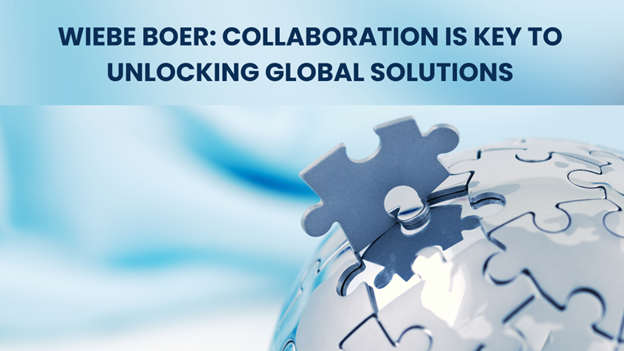
The modern world struggles on every front with an intermingled web of crises, from climate change and rising inequality to the current global health crisis. These crises cry out for critical focus, as nobody holds the key to that door. Siloed operations lead to a new paradigm wherein businesses, nonprofits, and governments work in isolation. That’s the heart of the “shared value” model: a philosophy whereby leaders like Wiebe Boer believe that significant societal needs and business imperatives are symbiotically linked.
Wiebe Boer: Championing Collaboration
Wiebe Boer has spent his remarkable career at the crossroads of energy, consulting, philanthropy, and higher education. He is a part of the many voices talking about cross-sector collaboration. He has been a vocal advocate who firmly states: “The scale and complexity of today’s challenges require collaboration across sectors and geographies.” It’s not just romantic platitudes; statistics support the premise that collaboratives—a thread that runs parallel to the work Boer leads—perform better than solitary endeavors. For example, according to the Boston Consulting Group, businesses that engage in cross-sector relationships and become viral can have up to 30% greater social effects than those that operate alone. Furthermore, such collaborations are seen by many as you putting your best foot forward on issues that affect a variety of topics, from day-to-day life standards to significant problems that affect our collective future.
Wiebe Boer’s Transformative Journey: Shared Value in Action
Wiebe Boer’s career is a testament to the power of cooperation; it’s about creating jobs by acknowledging the interconnectedness of many industries rather than by siloing them off. Boer’s work demonstrates the effect that can be achieved when several parties collaborate, as seen by the establishment of Boston Consulting Group‘s presence in West Africa, the growth of a Nigerian conglomerate’s charitable arm, his involvement in impact work at the Rockefeller Foundation and the introduction of Shell’s renewable energy efforts in Nigeria.
The Strengths Each Sector Brings to the Table, as Exemplified by Wiebe Boer’s Work
- Business: Innovation, financial resources, scalability, market access. Boer’s leadership in launching Shell’s renewable energy programs in Nigeria is the best example of using business strengths to serve social betterment.
- Nonprofits: Deep community connectivity, niche expertise, passion for social change. Boer’s success scaling the philanthropic arm of a Nigerian conglomerate is but one testament to the influential role nonprofits can play in localized impact.
- Government: Policy framework, regulatory authority, and ability to execute at scale. This experience emphasizes the role of policy that enabled Boer to enable sustainable solutions in navigating complex government engagement for setting up BCG in West Africa.
Wiebe Boer Principles for Successful Collaboration: Lessons from a Leader
Shared vision and objectives: A clearly stated, unifying purpose that appeals to every partner. The goals MUST align in such partnerships, as a lack of communication in such ventures can cause unforeseen friction between the parties involved.
Complementary Strengths: Note how the partners’ unique strengths are valued and leveraged. One group could focus on fostering community engagement while the other takes care of state or federal ties.
Open Communication and Trust: The ability to transact openly and nurture relationships is mandatory for such collaborations. Dig deep into the partnering organization’s culture and work ethic to ensure alignment.
Measurable Impact: Establish clear metrics and progress to ensure accountability by routinely tracking successes and failures. Impact data and how you track it can make a difference, not only in the business but also on a state level, influencing the next generation of policymakers.
Business Case for Collaboration
Beyond moral imperative, there is compelling proof that purpose-driven companies outperform their peers. According to Cone Communications, 87% of consumers will buy a product because a company advocated for an issue they cared about. Employees in purpose-driven companies also improve their levels of engagement and satisfaction.
Engaging a Collective Mind
Only through collaboration between organizations can such isolated sectors overcome the complex problems of climate change, poverty, and inequality. To businesses, this means a shift from the bottom-line preoccupation toward a realization that social impact in the work exemplified by Wiebe Boer is good for the bottom line.
It has to do with nonprofits leveraging businesses for scale, as Boer did by bringing business expertise to help expand the reach of philanthropy.
To Governments, this means creating enabling environments and forging partnerships to underpin progress, inspired by how Boer navigated the policy landscapes.
It’s important to understand that social impact businesses are only sometimes immediately profitable. Building something precious takes time and careful planning. Success in this field often relies on the wealth of the greater good you create. Conscious, caring, and society-oriented business models attract community support, leading to long-term organic financial growth.
Wiebe Boer’s story amply illustrates that the future lies with those who build bridges, make alliances, and galvanize collective action. And as Wiebe Boer has shown, the opportunities for positive changes surrounding us are limitless. The question is: Are we ready to take the reins?
Call to Action: Join the Collaborative Movement
Share examples of successful cross-sector collaboratives you have either participated in or witnessed. Share this with your community to garner support and build awareness.
What are the most significant blocking points, and how do we overcome them?
How can more businesses, nonprofits, and governments adopt a collaborative mindset like Wiebe Boer’s?
The world needs solutions, and with them comes collaboration. Let us work together toward our shared future.




















